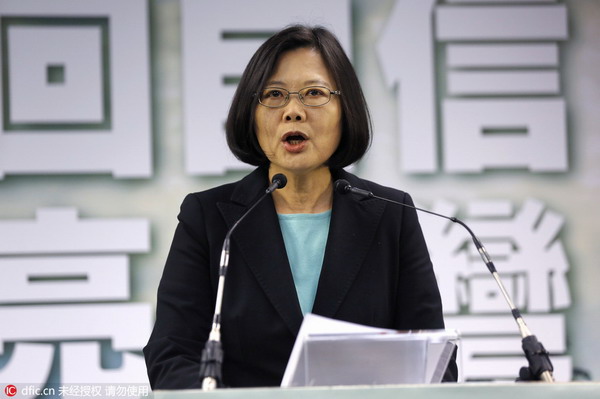 |
|
Taiwan's main opposition Democratic Progressive Party, DPP, Chairperson Tsai Ing-wen speaks during a press conference in Taipei, Taiwan, Wednesday, April 15, 2015. [Photo/IC] |
Tsai Ing-wen, chairwoman of Taiwan's Democratic Progressive Party, is expected to assume the island's leadership on May 20 and deliver her inauguration speech. Asked about whether she endorses the 1992 Consensus that Taiwan and the mainland are both parts of one China, Tsai is indeed changing her tone, but toward a more vague and less convincing direction.
The peaceful development shared by the mainland and Taiwan during the past eight years, has a lot to do with the political foundation that both sides of the Taiwan Straits adhere to the 1992 Consensus.
Although toning down her previous rhetoric endorsing the island's "independence", Tsai has refrained from elaborating on what should be done to "preserve the status quo", and refuses to offer an unequivocal answer to inquiries about what her position is regarding the 1992 Consensus on one China.
In all likelihood, she may try to keep beating around the bush in her inauguration speech by acknowledging the 1992 cross-Straits talks and the need to seek common ground while shelving differences.
But as the past six decades have repeatedly proved, cross-Straits relations only enjoy peaceful development when both sides reach the consensus that the island and the mainland belong to one China. When the island seeks to challenge that consensus, relations fall prey to instability and unrest.
This is an important lesson that the DPP, which led cross-Straits relations to the brink of breakdown when it governed the island from 2000 to 2008, should keep in mind.
The then DPP leader Chen Shui-bian relentlessly pursued Taiwan's formal "independence", which not only dealt a heavy blow to local economy and people's livelihoods, but also served as a ticking time bomb threatening regional stability. He was eventually voted out of power in the 2008 leadership election and it was Ma Ying-jeou, the leader of Kuomintang, who put relations back onto the right track by endorsing the 1992 Consensus.
Of course, it is clear that Tsai will not play with fire again in the way that Chen did. She wants to maintain the status quo as well as enjoy the dividends the island has gained as a result of the past eight years of peaceful exchanges. Nevertheless, she is dreaming if she thinks she can be a free rider on the peaceful development that has been based on both sides' adherence to the 1992 Consensus.
It is no exaggeration to say that Cross-Straits relations will be bumpy over the next four years under Tsai's leadership if she refrains from making sincere amendments to her party's pro-independence stance and keeps equivocating over endorsing the 1992 Consensus.
Although Tsai has acknowledged the significance of peaceful cross-Straits ties to Taiwan and has stressed that both the mainland and Taiwan are responsible for cross-Straits peace and stability, she seems to regard the mainland as a "threat" to the island's development, rather than an opportunity.
The truth is, the stance she has adopted will prove counter-productive, because expressing her support for the 1992 Consensus is the only way to prolong cross-Straits exchanges and enhance mutual political trust.
The author is an associate professor at the Collaborative Innovation Centre for Peaceful Development of Cross-Straits Relations.

I’ve lived in China for quite a considerable time including my graduate school years, travelled and worked in a few cities and still choose my destination taking into consideration the density of smog or PM2.5 particulate matter in the region.